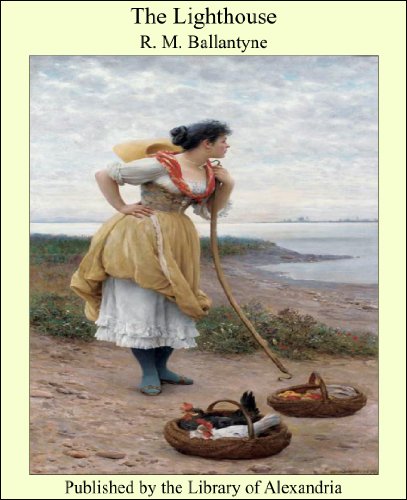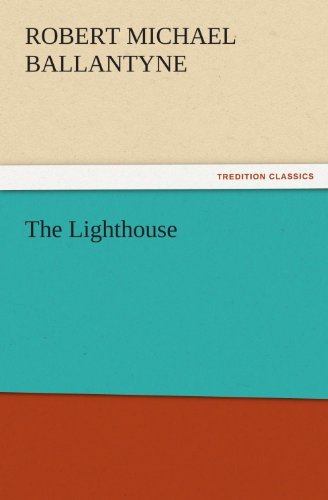-
The Lighthouse Keeper's Tea
David Armitage, Ronda Armitage
Paperback (Gardners Books, June 30, 2002)When Mr Grinling decides he needs a hobby, he tries everything from baking to bird-watching. But one morning a stroll along the beach inspires Mr Grinling to take up a most unlikely pastime.
-
The Lighthouse Keeper's Cat
Ronda Armitage, David Armitage
Paperback (Scholastic Ltd, March 31, 1997)Hamish the lighthouse keeper's cat is rather partial to Mrs Grinling's cooking. When he overhears her suggest he should miss breakfast, he's upset and thinks about looking for another home. This tale comes from the authors of "The Lighthouse Keeper's Picnic" and "The Lighthouse Keeper's Lunch".
-
The Lighthouse And It's Keeper
Marie Allred
Paperback (Independently published, June 28, 2019)Allred's new stand-alone poetry collection entitled "The Lighthouse And It's Keeper" is a breathtaking journey that enlightens and uplifts her readers from all walks of life. As she describes the beauty of the lighthouse (or the life of the reader) and the keeper (the reader themselves), Allred graces us with the beautiful gift of a poetic guide to self-acceptance and self-love that each of us not only desires but truly deserves. As always, her words are somehow both rawly poignant and yet utterly light and warm as the morning sun at the same time, providing us all with a seemingly contradictory - yet nonetheless real - sense of wonder and camaraderie so intense it is unlike any other poet before her.
-
The Lighthouse
R. M. Ballantyne
eBook (Library of Alexandria, Dec. 27, 2012)Early on a summer morning, about the beginning of the nineteenth century, two fishermen of Forfarshire wended their way to the shore, launched their boat, and put off to sea. One of the men was tall and ill-favoured, the other, short and well-favoured. Both were square-built, powerful fellows, like most men of the class to which they belonged. It was about that calm hour of the morning which precedes sunrise, when most living creatures are still asleep, and inanimate nature wears, more than at other times, the semblance of repose. The sea was like a sheet of undulating glass. A breeze had been expected, but, in defiance of expectation, it had not come, so the boatmen were obliged to use their oars. They used them well, however, insomuch that the land ere long appeared like a blue line on the horizon, then became tremulous and indistinct, and finally vanished in the mists of morning. The men pulled “with a will,”—as seamen pithily express it,—and in silence. Only once during the first hour did the big, ill-favoured man venture a remark. Referring to the absence of wind, he said, that “it would be a’ the better for landin’ on the rock
-
The Lighthouse Keeper's Christmas
Ronda Armitage, David Armitage
Paperback (Gardners Books, Sept. 30, 2003)Mr Grinling and his great-nephew, George, find themselves stranded in the lighthouse on a stormy Christmas night. With no Mrs Grinling, no food or no presents, they wonder if this will be the worst Christmas ever. K
K
-
The Grumpy Lighthouse Keeper
Terrizita Corpus, Maggie Prewett
Paperback (Magabala Books Aboriginal Corporation, May 1, 2017)When the lighthouse keeper returns from checking the lamp for passing ships, he discovers his bed has been taken over by slimy sea creatures, and he is very grumpy. With a beautiful design complemented by exquisite illustrations, The Grumpy Lighthouse Keeper is inspired by the iconic Broome lighthouse and the remains of the old dwelling that sits on the edge of Cable Beach. L
L
-
The Lighthouse Keeper's Picnic
David Armitage, Ronda Armitage
Paperback (Scholastic, Sept. 15, 1994)Mrs Grinling is the best cook in the whole world. But when she puts on a delicious spread for the village picnic, Mr Grinling wishes he hadn't eaten so much. K
K
-
The Lighthouse
Denise Akeroyd-Guillory
language (FriesenPress, Oct. 25, 2015)All children need someone who will listen to them, support them, and protect them. This concept is metaphorically expressed in The Lighthouse, by Denise Akeroyd-Guillory, with a lighthouse representing a child’s primary source of support. Through engaging and fast-moving text and vibrant and relevant illustrations, the idea of a lighthouse and its parallel to children’s primary support network is presented in a straightforward and easily understandable manner. This book can be used by parents, guardians, teachers, mental health professionals, and anyone else in a helping profession to assess a child’s primary support person. In fact, The Lighthouse has been shown to be an effective tool for individuals of all ages in helping them to express the person or people who are their primary support resources, even though it is primarily a children’s book. Its message of the importance of support for each person is inspirational.
-
The Lighthouse
R. M. (Robert Michael) Ballantyne
eBook (tredition, Feb. 28, 2012)This book is part of the TREDITION CLASSICS series. The creators of this series are united by passion for literature and driven by the intention of making all public domain books available in printed format again - worldwide. At tredition we believe that a great book never goes out of style. Several mostly non-profit literature projects provide content to tredition. To support their good work, tredition donates a portion of the proceeds from each sold copy. As a reader of a TREDITION CLASSICS book, you support our mission to save many of the amazing works of world literature from oblivion.
-
The Lighthouse Keeper's Tea
Ronda Armitage, David Armitage
Paperback (Scholastic dump, May 18, 2001)When Mr Grinling decides he needs a hobby, he tries everything from baking to bird-watching. But one morning a stroll along the beach inspires Mr Grinling to take up a most unlikely pastime.
-
The Lighthouse Keeper's Daughter
E L Wohlford
Paperback (Vantage Press, April 1, 2008)Book by Wohlford, E L K
K
-
The Lighthouse Keepers Wife
Constance Small
Paperback (Univ of Maine Pr, Jan. 15, 1986)Book by Small, Constance